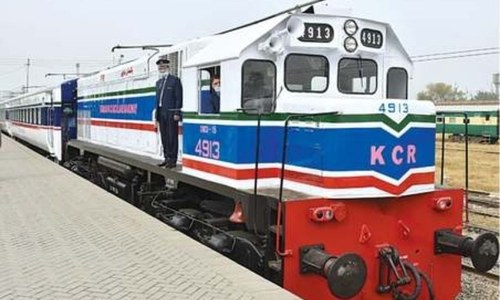KARACHI/ISLAMABAD: Calling it a ‘great news’ for Karachiites and predicting to be ‘a world-class transport facility’ in the making, the federal government on Wednesday approved the Karachi Circular Railway (KCR) project, which will be built in three years at an estimated cost of more than Rs200 billion.
While the besieged Prime Minister Imran Khan was facing a no-confidence vote jointly filed by opposition parties, the Pakistan Tehreek-i-Insaf (PTI) government and its leadership saw the approval of the train plan as a major development and described it as a ‘proof of their commitment’ to Karachiites and a ‘justification’ for their mandate from the metropolis.
The approval of the mega project came at a meeting of the Executive Committee of the National Economic Council (Ecnec), presided by Finance Minister Shaukat Tarin in Islamabad.
It gave a nod to the development, operation and maintenance of KCR as a modern urban railway under public-private partnership mode at a total cost of Rs201.572bn.
The project cost was revised in Ecnec meeting as the Central Development Working Party (CDWP) and the Public-Private Partnership Authority (P3A) Board had last month cleared its cost at Rs273bn.
Ecnec okays three-year project with revised cost of Rs201.5bn
“The project envisages construction of a 43.225-kilometre dual track urban mass transit system to be built in a period of three years. Karachi Circular Railways Management Company (KCRMC) will be responsible to keep an oversight related to the execution, operation and maintenance of the project,” said a statement.
The Ecnec also set up a committee led by the finance minister to review the transaction structure related to the federal government for viability gap funding (VGF) contribution.
Groundbreaking performed last year
In September 2021, PM Khan performed the groundbreaking ceremony of the KCR at the Karachi Cantonment Railway Station. Under the fresh plan, the 44km KCR would be rebuilt by constructing three underpasses, a flyover and an elevated 6.4-km structure along with the laying of new rail tracks on most part of the route for running electric trains.
With the groundbreaking ceremony of the KCR and its approval by the Ecnec coupled with the commercial launch of the Green Line bus service in January 2022, the federal government sees a resolution of the transport crisis in Karachi in “one of the best circular railway systems in the world”.
Federal Minister for Planning and Development Asad Umar tweeted: “Great news for the people of Karachi”. “The ECNEC has approved a modern circular railway plan [for Karachi]. Insha Allah, like cities with modern railway systems, the people of Karachi would also get the latest and world class travelling service. The PTI has justified its mandate from Karachi in true spirit.”
Service closed in 1999
Commissioned in 1964, the KCR was originally designed to help the employees of Pakistan Railways to travel between their workplaces (at and around the City and Cantonment railway stations) and their residences in Karachi’s eastern neighbourhoods.
The service was later turned into a full circle of 44 kilometres in 1970 and connected four main work areas of Karachi — the port, the SITE area, the city’s central commercial areas like Saddar, and the Landhi Industrial Area.
The KCR remained the means of transportation of choice for the people of Karachi till 1984 when the number of its trains was reduced.
Reasons for the move were stated to be the lack of maintenance and repair, a yawning gap between expenditure due to higher cost of fuel and operational costs and revenue decreasing due to subsidised tickets, and the government’s inability to spend money on improvement of tracks and stations.
The KCR was finally shut down in 1999, forcing thousands of its daily users to travel by road.
Published in Dawn, March 17th, 2022














































